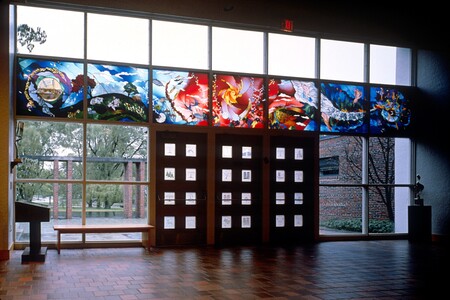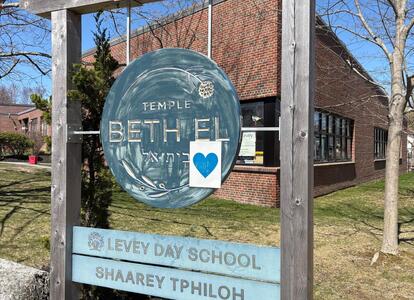Temple Beth El (TBE)
BackTemple Beth El (TBE)
400 Deering Avenue
The trail moves up Dartmouth St. across Forest Ave to Deering Ave., and right two blocks to the campus of Temple Beth El, Levey Day School and the current Shaarey Tphiloh. You can circle the TBE campus by taking a left on Wadsworth, right on Devonshire and right again to go back onto Deering.
On Rosh Hashanah in 1947, Beth El was established by Portland Jews who wanted a Conservative congregation. Three years later, Congregation Beth El had realized its dream of a permanent home in Portland; the temple you see here opened in 1950. Over the next half century, TBE would become the major regional center for Conservative Judaism north of Boston, with more than 300 families in 2020. Today, TBE is much more than a house of worship for one congregation. In addition to the temple itself and its religious school, the TBE campus is now the third home of the older, and now smaller, Orthodox shul Shaarey Tphiloh (see Stops E04 and W04), the now interdenominational Levey Day School (Stop W03), a Holocaust memorial, and the Shalom Community Park.
Though the movement towards a more egalitarian, Conservative Judaism had been accepted in most Jewish communities across the country by the 1950s, there was resistance in Portland from traditional religious leaders. When it was established, TBE presented a clear contrast for Jews looking for a more modern religious experience. The single-story building had serene lines and plain walls, offered prayer services in both Hebrew and English, established mixed gender seating, and music (there was a choir and organ). And as the JCC’s membership declined, TBE’s only grew.
TBE’s first rabbi was Rabbi Ephraim Bennett, who served as the congregation’s spiritual leader from 1948 to 1953. The next long-term appointment was Rabbi Harry Sky, who served at TBE from 1961 to 1986. He was very active in human and civil rights issues in the 1960s, even marching with Dr. Martin Luther King in Selma, Alabama. Afterwards, as Rabbi Emeritus, Sky was instrumental in the establishment of the Osher Lifelong Learning Institute at USM (Stop W08). When TBE hired Rabbi Carolyn Braun (one of the first female rabbis to be ordained by the Jewish Theological Seminary) in 1995, it became the largest Conservative synagogue in the entire country to be led by a woman. Braun retired in 2024. In 2025, TBE since hired a new female rabbi, Rachel Simmons, to lead the congregation forward.
For more than thirty years (1951 to 1985), TBE congregants also enjoyed the passionate and powerful tenor of Cantor Kurt Messerschmidt. Born in 1915 near Berlin, Messerschmidt, an accomplished singer and musician, had a front seat to the rise of fascism in Germany. Kurt and his wife Sonja were both Holocaust survivors (their remarkable biographies can be viewed on permanent exhibition at the Maine Jewish Museum). After the war ended, their family moved to the U.S., landing briefly in the Bronx while Kurt served as cantor for a congregation in New Jersey. He was invited to join TBE by Rabbi Bennett. The Messerschmidts’ first Maine home was at Forest Park. After living in concentration camps, a forest, a displaced persons camp, Munich, and briefly, in a tenement in the Bronx, Kurt liked to look from Forest Park out across Back Cove to the ocean horizon. He said it was the furthest he had seen across land for decades. Kurt Messerschmidt died in 2017 at the age of 102, and will be remembered as an iconic and beloved fixture of Portland’s Jewish community.

